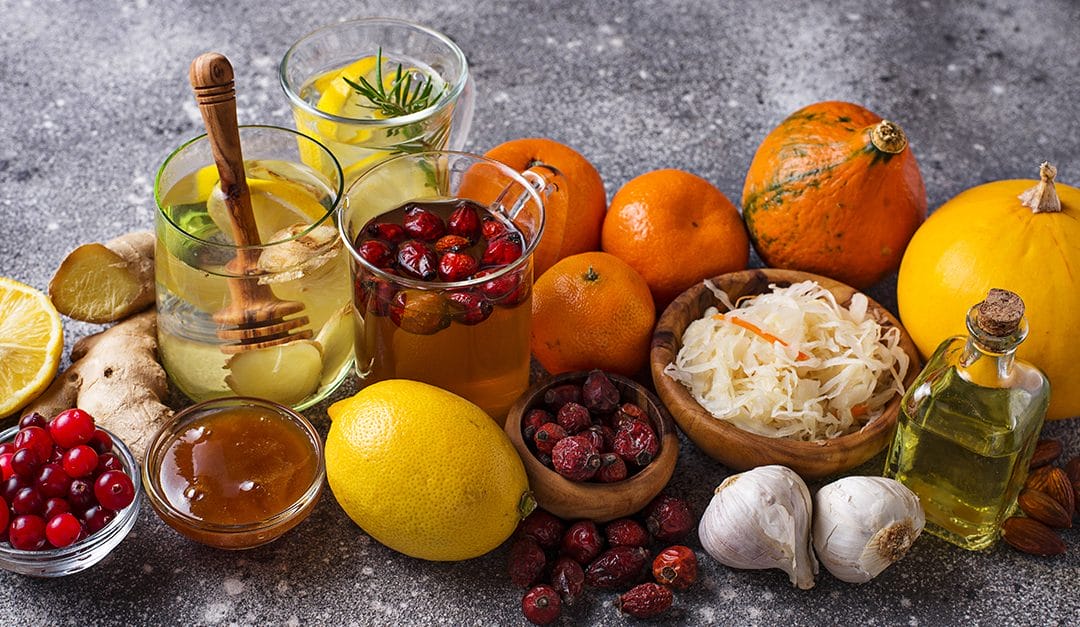You’ve Likely Heard ‘Feed A Cold; Starve A Fever’—But There’s A Lot More To Healthy Nutrition Before, During, And After You’re Under The Weather
While your genes certainly play a big part in determining your general health, what you eat on a daily basis definitely has implications for the long term (conditions such as heart disease, high blood pressure, and high cholesterol all have nutritional ties) as well as the short term (such as your susceptibility to getting a cold or virus). Making the right food choices can help you avoid catching a bug—and help you quickly get back on the mend when you do succumb to a cold or the flu.
Foods to Eat When You’re Sick
Unless you have a stomach bug, it’s good to eat when you have a cold or the flu. And there definitely are some foods that will help you boost your immune system and help keep your energy up.
Yes, chicken soup (or broth) is full of iron, protein, and other nutrients—and the hot liquid can be soothing. Go for low-sodium varieties, though. Other good protein sources include chicken, fish, lean meats, eggs, and legumes.
Be sure to eat fruits and leafy vegetables to keep up your vitamins C and E, as well as fiber, calcium, and antioxidants. Good options include strawberries, tomatoes, spinach, kale, and broccoli. Oatmeal or other whole grains is another solid choice.
Foods to Avoid When You’re Sick
If you have any appetite at all when you’re under the weather, you probably crave your favorite comfort foods. But it’s best to avoid greasy, heavy foods, especially when you have gastrointestinal symptoms, but that’s not all to steer clear of. In fact, when your stomach is uneasy, you should even avoid the fruits, vegetables, and whole grains just mentioned … at least until your stomach is steadier, which is usually after the first couple of days when it comes to the flu.
Be careful not to overdo the sugary juices and sports drinks, which tend to be low in nutritional value and can cause inflammation. And remember that dairy increases mucus for some folks.
When You’re Starting To Feel Better
You can pretty much continue to eat healthy foods throughout a cold or flu, unless you’ve avoided the aforementioned foods that are hard on the tummy. If that’s the case, you’ll want to ease back into a regular diet. During the transition, try the BRAT diet: Bananas, Rice, Applesauce, and Toast.
Staying Hydrated
Most everyone knows the importance of hydration, especially when you’re sick. Why is that? Well, a fever draws out your body’s moisture, and mucus production drains fluid as well. Top that off with taking antihistamine medication and you’ll get even more dried out.
Drinking plenty of water is your best avenue. That way, you’ll avoid ingesting too much sugar and sodium, while the increased fluid intake loosens up mucus. And avoid alcohol and caffeine while you’re not well. Not only can those beverages dehydrate, they also can make it difficult to get the extra sleep you’ll need.
Avoiding Illness
Of course, what you eat can affect your susceptibility to catching a cold or coming down with the flu. If you’d like to strengthen your immune system and get sick less often, make sure you stock up on these immune system boosters:
- Ginger – anti-inflammatory
- Extra-virgin olive oil – anti-inflammatory
- Whole grains – anti-inflammatory
- Green tea – anti-inflammatory, antioxidant
- Blueberries – antioxidant
- Dark chocolate – antioxidant
- Apples (of course!) – antioxidant
- Oranges – vitamin C
- Tomatoes – vitamin C
- Spinach – vitamin C
- Eggs – vitamin D
- Greek yogurt – probiotic
- Salmon – zinc
Feed A Cold?
So, what about the old adage, “Feed a cold, starve a fever”? Turns out it’s wrong—eating, when you’re up to it, helps you heal.
Really want to eat healthier but need some help? In the Miami area, look to The Pickled Beet for delicious, healthy meals custom-prepared with the freshest ingredients. We work with individuals, couples, and families to find meals that are tasty, nutritious, and best fuel the body no matter what dietary requirements might be part of the equation. Contact us for a free consultation.


